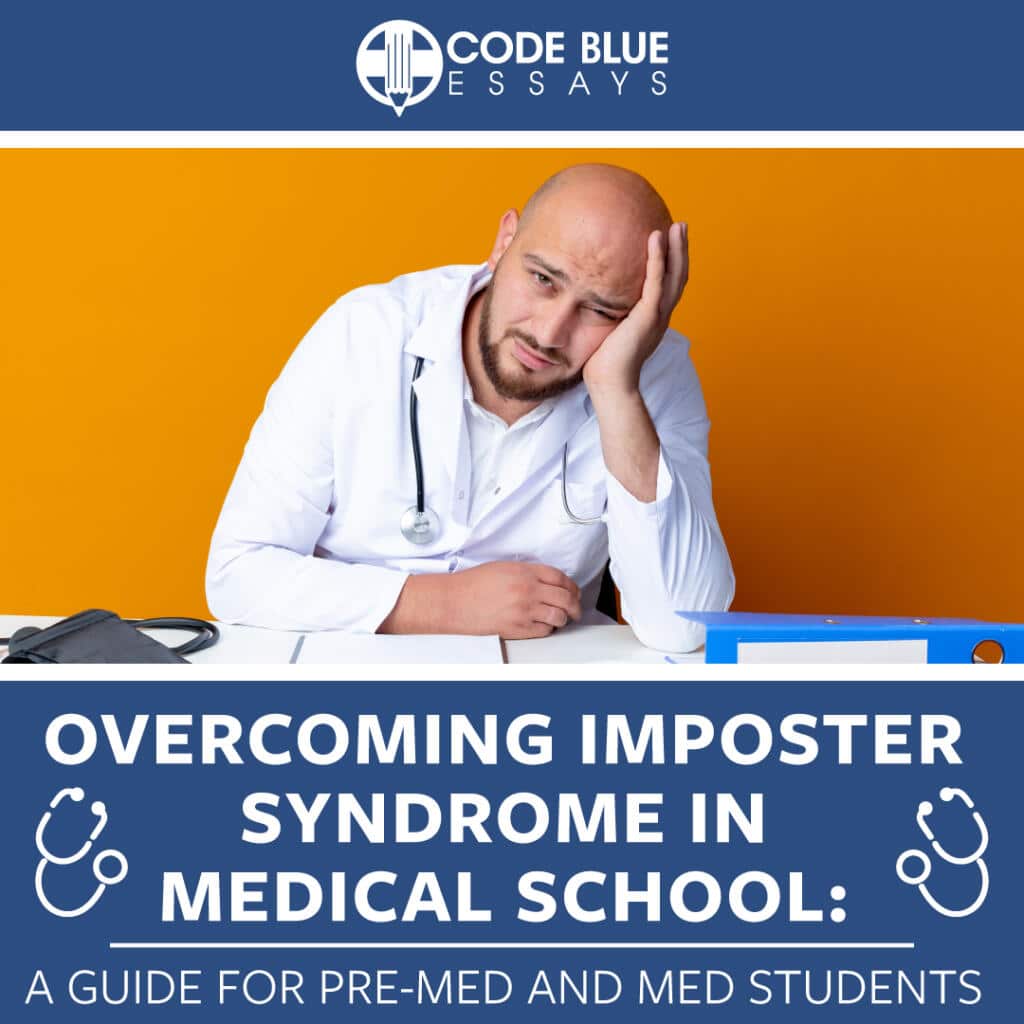Overcoming Imposter Syndrome in Medical School: A Guide for Pre-Med and Med Students
0 Comments
0 Comments

August 22, 2023 in Admissions, Application, Clinical Experience, dental school, Letters of Recommendation, MCAT, Medical School, Medical School Application, Medical School Tips, Personal Statement Tips, Premed, reapplicants, secondary applications, Secondary Essay, Study skills, Supplemental Application
Medical school can be an incredibly challenging experience for pre-med and medical students, and imposter syndrome can make the journey even more difficult. Imposter syndrome is a psychological phenomenon where individuals doubt their abilities and accomplishments, and feel like they are frauds in their field of study.
In this blog post we want to provide tips for pre-med and medical students on how to overcome imposter syndrome in order to succeed in medical school…
Understanding Imposter Syndrome
According to research, up to 25% of male medical students and nearly half of female medical students experience imposter syndrome. This feeling of inadequacy and self-doubt can lead to feelings of burnout during medical school, or even self-doubt during the application process.
Society’s focus on social media doesn’t help– it often contributes to students’ feeling like an imposter. Social media often portraits a false sense of perfection. You’re only seeing what people want you to see, and not their struggles or what’s going on “behind the scenes.” Pre-med and medical school blogs and social media sites often portray the need to be ‘perfect’ or to hide one’s flaws. When in reality, it’s unrealistic and fake.
By recognizing the signs and symptoms of imposter syndrome and understanding its underlying causes, pre-med and medical students can take steps to overcome these feelings and achieve their goals. Keep a mindset of growth rather than perfection, and create a support system around you to help keep those feelings of imposter syndrome from creeping in.
Common Causes of Imposter Syndrome
Imposter syndrome is more common than you think and is characterized by a persistent belief that one does not deserve their success and that they are frauds. This debilitating mindset can lead to burnout, anxiety, and depression if not addressed.
Research shows that imposter syndrome is prevalent among medical students and professionals. Studies have shown that 25% of medical students and residents, as well as nearly 30% of doctors, experience imposter syndrome. And surprisingly, doctors are 30% more likely to suffer from imposter syndrome compared to similarly-aged individuals in other career fields.
Several factors contribute to the development of imposter syndrome in pre-med and medical students. Family upbringing can contribute to it, especially for students raised in a household that emphasizes achievement and perfection. Other things like personality traits can contribute to imposter syndrome as well. “Perfectionists” are often more likely to develop imposter syndrome.
Familial and cultural pressures can also lead to imposter syndrome in pre-med and medical students. Society often places high expectations and standards for aspiring doctors that can make a student feel like they aren’t measuring up.
Signs and Symptoms of Imposter Syndrome
Some common signs and symptoms of imposter syndrome include:
It’s common to experience anxiety, stress and depression with these feelings which leads to academic challenges, burnous and even difficulty building relationships with peers.
How to Overcome Imposter Syndrome
Imposter syndrome can be challenging to overcome, but there are practical strategies and tips that can help pre-med and medical students build their confidence and overcome self-doubt…
1. Recognize your strengths: Focus on your achievements and acknowledge your strengths and abilities. Begin doing this during your application and continue throughout your medical training.
2. Reframe negative self-talk: Change your inner dialogue and replace negative thoughts with positive affirmations. Meditation and self talk can help retrain your internal dialogue. After all, imposter syndrome is a story you tell yourself, not a real, physical phenomenon.
3. Practice self-compassion: Be kind to yourself and understanding.
4. Celebrate small wins: Acknowledge and celebrate small successes to build confidence and boost self-esteem.
5. Take risks: Embrace challenges and step outside of your comfort zone to build resilience and confidence.
6. Surround yourself with positive people: Seek support from friends and family who can encourage and uplift you.
7. Seek professional help: Consider reaching out to a counselor or therapist who can help you overcome imposter syndrome and develop coping skills. Friends and family outside of medicine can also help offer different perspectives, which can be refreshing.
8. Practice acceptance. Accept the fact that it’s not uncommon to feel this way as you apply to medical school or during your medical school training. Give yourself time and space to work through these feelings.
Feelings of self-doubt often begin to creep in during the application cycle. Our team at Code Blue Essays understands the significance of applying to medical school and how stressful it can be, but with our guidance and help we can help you focus on your strengths and showcase what a competitive applicant you are!
Check out our Application Review Services and learn more about our Newest Medical School Application Tool!